
High-Quality Polyvinyl Alcohol (PVA) | Industrial Grade
Understanding Polyvinyl Alcohol (PVA): A Core Industrial Polymer
Polyviny alcohol (PVA), a synthetic polymer, stands as a cornerstone in numerous industrial applications due to its unique combination of properties, including excellent water solubility, film-forming capability, adhesive strength, and chemical resistance. This hydrophilic polymer is derived from polyvinyl acetate through hydrolysis, a process that removes acetate groups and replaces them with hydroxyl groups. The degree of hydrolysis significantly impacts the final properties of PVA, making it a highly versatile material adaptable to specific application requirements across diverse sectors, from construction to textiles and beyond. Its eco-friendly characteristics, such as biodegradability and non-toxicity, further enhance its appeal in an era increasingly focused on sustainable industrial practices.
The demand for polyviny alcohol continues to grow, driven by innovations in sustainable packaging, advanced construction materials, and specialized industrial adhesives. As a leading material in the chemical industry, understanding its intricate manufacturing process, technical specifications, and broad application landscape is crucial for B2B decision-makers seeking optimized material solutions.
Manufacturing Process of Polyvinyl Alcohol
The production of polyviny alcohol is a multi-step chemical synthesis, primarily involving the polymerization of vinyl acetate followed by a controlled hydrolysis reaction. This process flow ensures the precise control over the polymer's molecular weight and degree of hydrolysis, which are critical determinants of its end-use properties.
Detailed Process Flow:
- 1. Raw Material Procurement: The primary raw material is Vinyl Acetate Monomer (VAM), typically produced from ethylene or acetylene. Other critical inputs include methanol (as a solvent) and catalysts.
- 2. Polymerization of Vinyl Acetate: VAM undergoes a radical polymerization process, usually in methanol solution, to form Polyvinyl Acetate (PVAc). This stage controls the molecular weight distribution. Common initiators include peroxides or azo compounds.
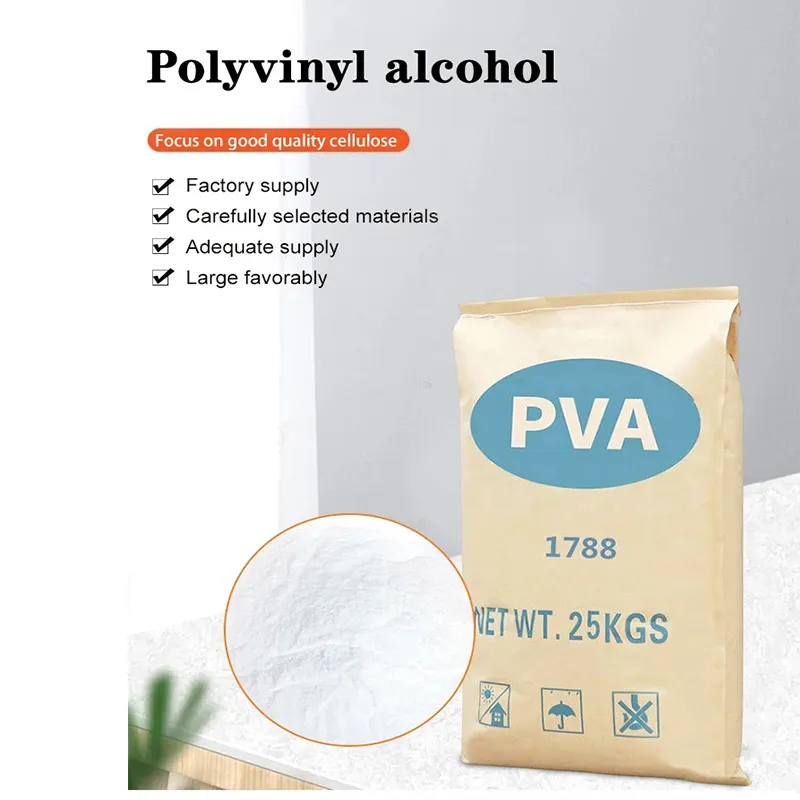
- 3. Methanolysis (Hydrolysis/Saponification): The resulting PVAc is then reacted with methanol in the presence of an alkaline or acidic catalyst (e.g., sodium hydroxide) to replace the acetate groups with hydroxyl groups. This is the critical step that converts PVAc into PVA. The extent of this reaction dictates the "degree of hydrolysis," a key characteristic influencing PVA's solubility and adhesive properties.
- 4. Separation and Purification: The PVA precipitates out of the methanol solution. It is then separated, washed to remove impurities and residual methanol, and dried.
- 5. Grinding and Packaging: The dried PVA is typically ground into a fine powder or granular form, screened to achieve desired particle size distributions, and then packaged according to industry standards.
Testing Standards and Quality Assurance:
Strict adherence to international testing standards is paramount for high-quality polyviny alcohol. Our products undergo rigorous testing in accordance with ISO 9001:2015 for quality management systems and specific ASTM/JIS standards for physical and chemical properties. Key parameters tested include degree of hydrolysis, viscosity of aqueous solutions, volatile content, ash content, and pH. These tests ensure consistency and performance reliability across all batches.
Service Life and Target Industries:
The service life of polyviny alcohol is typically excellent when stored under appropriate conditions (dry, cool environments). In its application, it contributes to extending the service life of end products due to its binding, film-forming, and protective qualities.
Target industries include:
- Construction: Essential for `pva cement` additives, tile adhesives, dry mix mortars, and coatings, improving workability, adhesion, and crack resistance.
- Textiles: Sizing agents, warp sizing, and printing thickeners.
- Adhesives: Wood glues, paper adhesives, and general-purpose binders.
- Paper Industry: Surface sizing agents and pigment binders.
- Emulsifiers & Dispersants: For polymerization reactions.
- Packaging: Water-soluble films for detergents, agrochemicals, and other specialized packaging.
Industry Trends and Market Dynamics for Polyvinyl Alcohol
The global polyviny alcohol market is experiencing robust growth, propelled by several key trends. Increasing demand for sustainable and biodegradable materials is a primary driver, positioning PVA as an attractive alternative to conventional petroleum-based polymers in various applications, particularly in packaging and agriculture. Furthermore, advancements in construction methodologies and a surge in infrastructure projects globally continue to bolster the demand for PVA as a high-performance additive in mortars, concrete, and coatings.
Key Market Drivers:
- Sustainability Push: The biodegradable nature of PVA makes it ideal for water-soluble packaging, reducing plastic waste and aligning with global environmental regulations.
- Construction Sector Growth: Enhanced performance in `pva cement` formulations, tile adhesives, and self-leveling compounds drives significant uptake.
- Textile Innovation: Development of advanced fibers and technical textiles utilizes PVA for its excellent sizing and binding properties.
- Technological Advancements: Research into new PVA grades with tailored properties (e.g., enhanced water resistance, specific dissolution rates) expands application possibilities.
Market Challenges:
While the outlook is positive, challenges such as fluctuating raw material costs (e.g., `polyvinyl acetate price`), intense competition among `polyvinyl alcohol manufacturers`, and the need for continuous R&D to meet evolving performance demands remain. Strategic partnerships and investment in advanced manufacturing techniques are crucial for maintaining competitiveness.
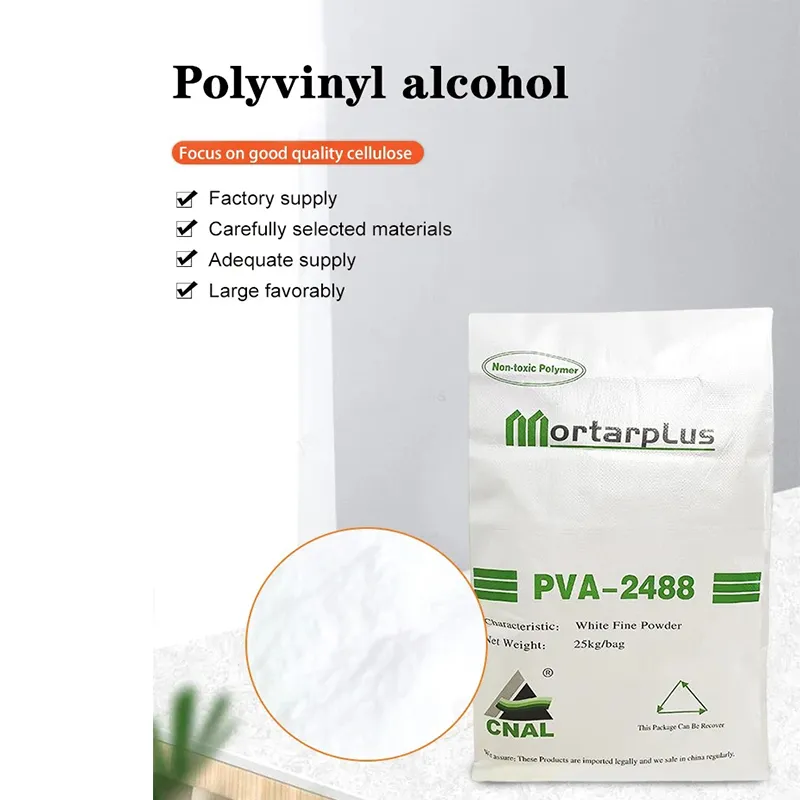
Technical Specifications and Product Parameters
The performance of polyviny alcohol is intrinsically linked to its specific technical parameters. Understanding these specifications is vital for selecting the appropriate grade for a given application, ensuring optimal performance and cost-efficiency.
Key Technical Parameters:
- Degree of Hydrolysis (Saponification Value): This indicates the percentage of acetate groups converted to hydroxyl groups. Fully hydrolyzed PVA (98-99% mol) offers higher water resistance and tensile strength, while partially hydrolyzed PVA (87-89% mol) provides better adhesion and cold-water solubility.
- Viscosity (mPa·s): Measured in a 4% aqueous solution at 20°C, viscosity is directly related to the polymer's molecular weight. Higher viscosity indicates higher molecular weight, influencing solution properties and film strength.
- Volatile Content (%): Represents the moisture content, impacting storage stability and precise formulation.
- Ash Content (%): Indicates the level of inorganic impurities, important for applications requiring high purity.
- pH Value: Affects solution stability and compatibility with other additives.
- Particle Size: Influences dissolution rate and dispersion characteristics.
Typical Product Specification Table:
| Property | Unit | Fully Hydrolyzed PVA (Typical) | Partially Hydrolyzed PVA (Typical) |
|---|---|---|---|
| Degree of Hydrolysis | mol% | 98.0 - 99.8 | 87.0 - 89.0 |
| Viscosity (4% solution, 20°C) | mPa·s | 20 - 60 (variable by grade) | 3 - 30 (variable by grade) |
| Volatile Content | % | ≤ 5.0 | ≤ 5.0 |
| Ash Content (as Na2O) | % | ≤ 0.5 | ≤ 0.7 |
| pH (4% solution) | - | 5.0 - 7.0 | 4.5 - 6.5 |
| Appearance | - | White Powder/Granule | White Powder/Granule |
Note: These values are typical and may vary slightly between grades and `polyvinyl alcohol manufacturers`.
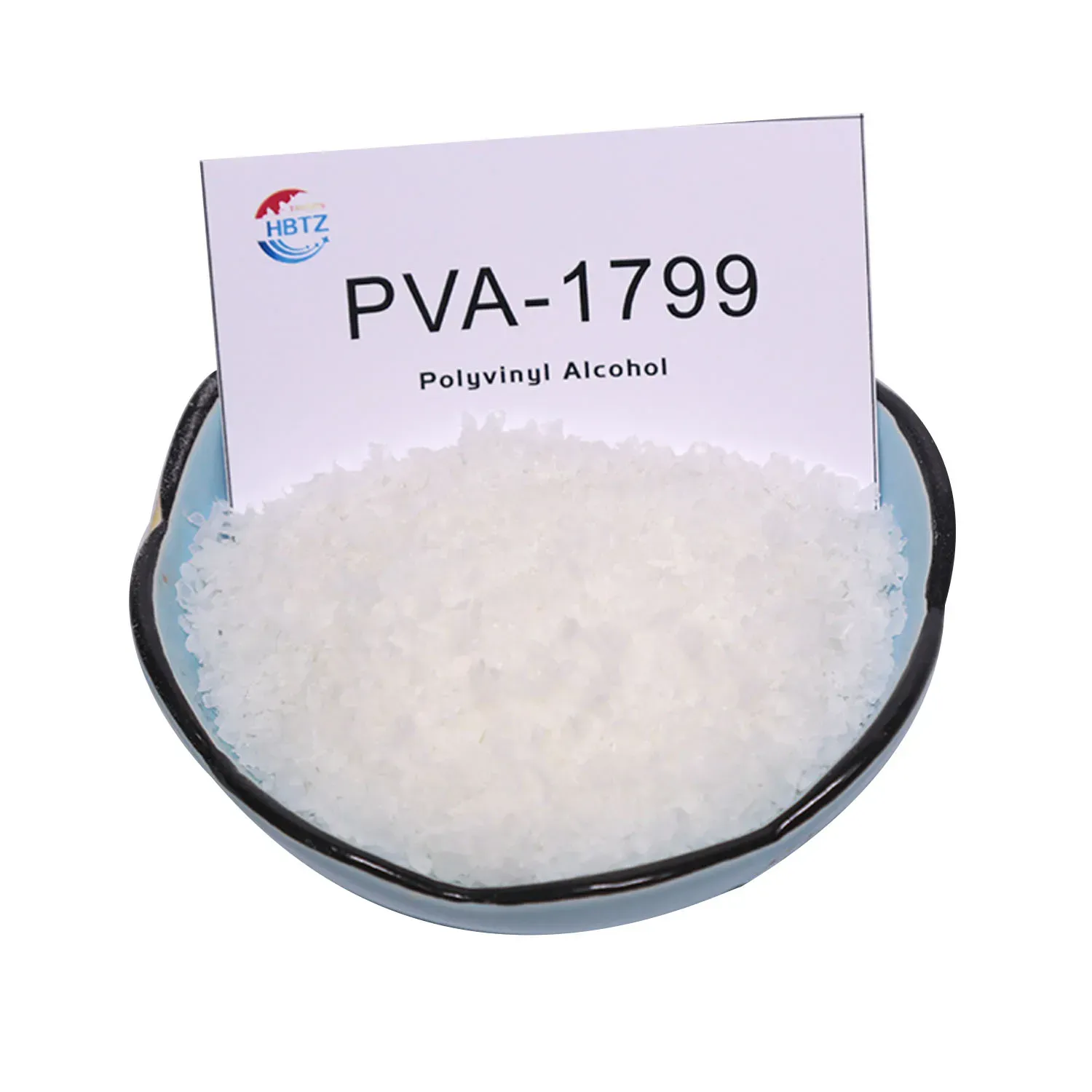
Application Scenarios and Technical Advantages
The versatility of polyviny alcohol enables its deployment across a multitude of industrial applications, where its unique properties deliver significant technical advantages and performance enhancements.
Key Application Scenarios:
- Construction Chemicals: As an additive in dry mix mortars, tile adhesives, putties, and grouts, PVA enhances workability, improves adhesion strength, reduces cracking, and increases water retention. For `pva cement` applications, it significantly boosts flexural strength and bond strength, extending the service life of concrete structures.
- Textile Sizing: Used as a warp sizing agent for various yarns (cotton, polyester, blended fibers), PVA improves weaving efficiency by reducing yarn breakage, enhances fabric smoothness, and protects fibers during processing. Its excellent film-forming properties are key here.
- Adhesives and Binders: PVA-based adhesives are widely used in paper, wood, and packaging industries for their strong bonding capabilities, excellent film formation, and compatibility with various substrates.
- Paper Industry: Applied as a surface sizing agent to improve paper strength, printability, and oil resistance. It also functions as a pigment binder in paper coatings, enhancing gloss and smoothness.
- Water-Soluble Films: Fully hydrolyzed PVA grades are formulated into water-soluble films for packaging detergents, agrochemicals, and medical laundry bags, offering convenience, precise dosage, and environmental benefits through biodegradability.
- Emulsion Polymerization: Acts as a protective colloid for vinyl acetate, acrylics, and other emulsions, stabilizing polymer particles and influencing particle size distribution.
Technical Advantages:
- Superior Adhesion: Forms strong bonds with various substrates, crucial for adhesives, coatings, and construction materials.
- Excellent Film Formation: Creates clear, strong, and flexible films with good gas barrier properties.
- Water Solubility & Biodegradability: Environmentally friendly characteristics, particularly for packaging and agricultural applications.
- Chemical Resistance: Exhibits good resistance to oils, greases, and solvents.
- Adjustable Properties: Degree of hydrolysis and molecular weight can be tailored to meet specific application requirements, offering unmatched versatility.
- Improved Workability: In construction, it enhances the rheology of cementitious mixtures, making them easier to apply and finish.
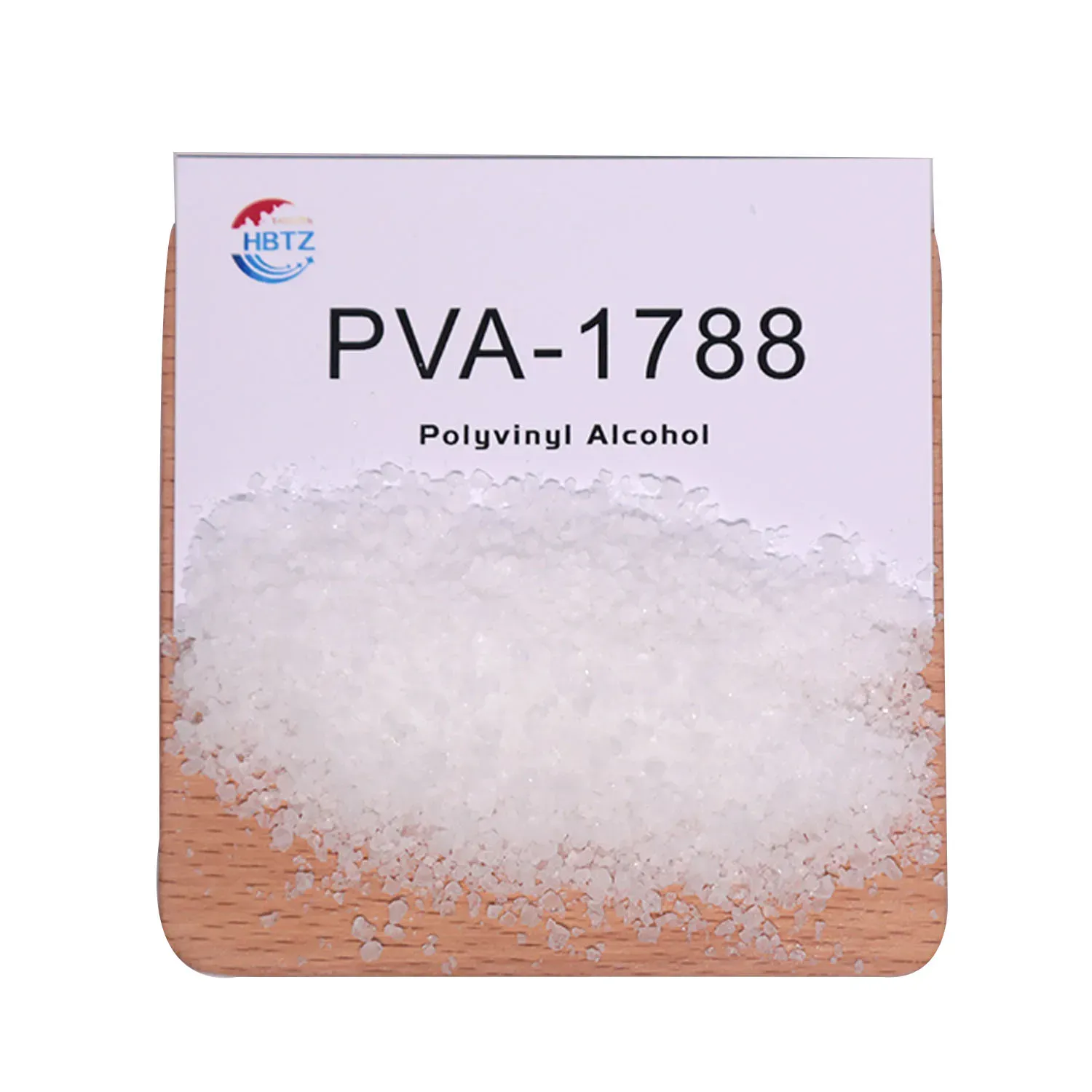
Vendor Comparison and Customized Solutions
Choosing the right supplier among various `polyvinyl alcohol manufacturers` is critical for securing consistent quality and tailored solutions. A comprehensive vendor comparison considers not just product specifications but also service, technical support, and the ability to provide customized grades.
Key Factors for Vendor Comparison:
- Product Quality & Consistency: Certifications (ISO, REACH), batch-to-batch consistency, and adherence to specified parameters.
- Technical Support & R&D Capabilities: Ability to provide application guidance, troubleshoot issues, and develop new grades.
- Customization Options: Flexibility in tailoring degree of hydrolysis, molecular weight, and particle size.
- Supply Chain Reliability: Lead times, logistics, and capacity to meet demand fluctuations.
- Pricing & Value: Competitive `polyvinyl acetate price` considerations, coupled with overall value, not just upfront cost.
- Environmental & Safety Compliance: Adherence to local and international environmental regulations, and safety data sheet (SDS) transparency.
Customized Solutions:
Recognizing that off-the-shelf solutions may not always suffice, leading `polyvinyl alcohol manufacturers` offer customized polyviny alcohol grades. This involves adjusting the degree of hydrolysis, molecular weight, and particle size distribution to achieve precise rheological properties, dissolution rates, adhesive strengths, or film characteristics required for highly specialized applications. For instance, a construction project might require a PVA grade with specific water retention and early strength development for `pva cement` additives, while a textile application demands a PVA with optimized film flexibility and wash-off properties. Our company excels in collaborative R&D to formulate bespoke PVA solutions that integrate seamlessly into complex industrial processes, optimizing performance and efficiency.
Application Case Studies & Customer Feedback
Real-world application case studies demonstrate the tangible benefits and proven performance of our polyviny alcohol products.
Case Study 1: Enhanced Tile Adhesion in High-Humidity Environments
A major construction company faced challenges with tile detachment in coastal regions due to high humidity and temperature fluctuations. Our technical team collaborated to develop a customized fully hydrolyzed PVA grade with enhanced water resistance and improved adhesion. By incorporating this specialized PVA into their tile adhesive formulations, the client reported a 40% improvement in bond strength under severe climate cycling tests (ASTM C1059), significantly reducing callbacks and improving project durability. "The customized PVA from Tangzhi HPMC has been a game-changer for our high-performance tile adhesives. It provides superior bonding even in challenging environments," stated their R&D Director.
Case Study 2: Optimized Warp Sizing for Sustainable Textile Production
A textile mill sought a more sustainable and efficient warp sizing agent. We provided a partially hydrolyzed PVA with optimal viscosity and film flexibility. This led to a 15% reduction in yarn breakage during weaving, a 20% decrease in sizing agent consumption due to better adhesion to fibers, and simplified desizing processes, contributing to lower effluent treatment costs. The mill highlighted the PVA's consistent performance and environmental benefits as key factors in improving their operational efficiency and green credentials.
Customer Feedback:
- "The consistency of their polyviny alcohol powder is exceptional, leading to stable emulsion polymerization batches for our coatings." - Leading Chemical Manufacturer, 7 years partnership.
- "Their technical team truly understands our needs for `pva cement` additives. The customized solutions have helped us maintain market leadership." - Global Construction Materials Supplier.
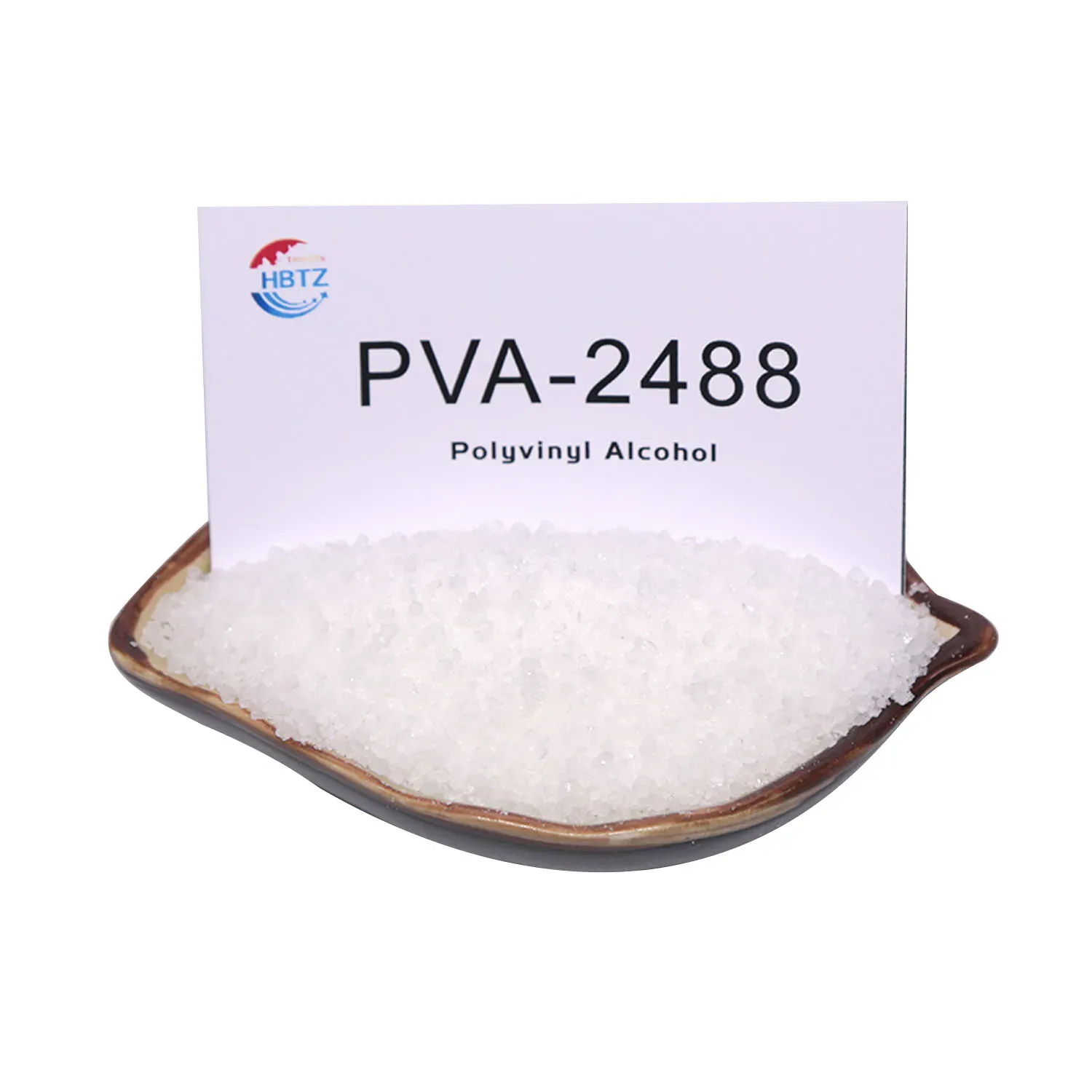
FAQ, Lead Time, Warranty, and Customer Support
Frequently Asked Questions (FAQ):
- Q: What is the primary difference between fully and partially hydrolyzed polyviny alcohol?
- A: Fully hydrolyzed PVA (e.g., 98-99% mol) has fewer residual acetate groups, making it less soluble in cold water but offering higher tensile strength and water resistance. Partially hydrolyzed PVA (e.g., 87-89% mol) is more soluble in cold water, has better adhesive properties, and is often preferred for applications requiring easier dissolution.
- Q: How does the molecular weight affect PVA performance?
- A: Higher molecular weight (indicated by higher viscosity) generally results in stronger films and higher adhesive strength, but also increases solution viscosity and might require higher dissolution temperatures. Lower molecular weight PVA offers lower solution viscosity and faster dissolution.
- Q: Is polyviny alcohol biodegradable?
- A: Yes, PVA is inherently biodegradable under aerobic conditions. Its degradation rate depends on factors like degree of hydrolysis, molecular weight, and environmental conditions (presence of specific microorganisms).
- Q: Can your PVA be used in food contact applications?
- A: Specific grades of PVA can be approved for food contact applications. Please consult our technical data sheets and relevant regulatory certifications for precise details regarding the specific grade you are considering.
Lead Time and Fulfillment:
We maintain robust inventory levels and efficient logistics to ensure timely delivery. Standard lead times for common PVA grades are typically 7-14 business days for domestic shipments and 14-30 days for international orders, depending on destination and volume. For customized solutions or large-volume orders, lead times will be confirmed upon order placement. Our global distribution network allows for flexible fulfillment options to meet diverse client requirements.
Warranty Commitments:
Our polyviny alcohol products are manufactured under stringent quality control protocols and are warranted to meet the specified technical parameters as per our product data sheets and certificate of analysis. We guarantee our products against defects in material and workmanship for a period of 12 months from the date of shipment, provided they are stored and handled in accordance with our recommendations.
Customer Support Information:
Our dedicated customer support team and technical experts are available to assist you with product selection, application guidance, troubleshooting, and customized solution development.
- Technical Support: [Email: techsupport@tangzhihpmc.com] | [Phone: +86-XXX-XXXX-XXXX]
- Sales Inquiries: [Email: sales@tangzhihpmc.com] | [Phone: +86-XXX-XXXX-XXXX]
- General Contact: Visit our website: www.tangzhihpmc.com
References
- M. J. Finch, "Polyvinyl Alcohol," in Kirk-Othmer Encyclopedia of Chemical Technology, John Wiley & Sons, 2000.
- ASTM D2989-18, Standard Test Method for Degree of Hydrolysis of Polyvinyl Alcohol.
- JIS K 6726, Polyvinyl Alcohol, Japan Standards Association.
- M. N. S. Al-Hafidh and J. Al-Mosawe, "Polyvinyl alcohol (PVA) as a green polymer and its various applications," Journal of Chemical and Pharmaceutical Sciences, vol. 12, no. 1, 2019.
- R. A. P. Singh, "Recent advances in poly(vinyl alcohol) and its derivatives," Progress in Polymer Science, vol. 72, pp. 20-43, 2017.
-
Top Cellulose Acetate Film Suppliers for Sustainable Industrial SolutionsNewsNov.20,2025
-
Cellulose Fiber Suppliers | Sustainable Natural Fibers for Industry and InnovationNewsNov.20,2025
-
Reliable Hydroxypropyl Methylcellulose Suppliers for Pharmaceutical & Industrial Use | TangzhiNewsNov.20,2025
-
Leading Cellulose Insulation Supplier for Sustainable Building MaterialsNewsNov.19,2025
-
Trusted Hydroxypropyl Cellulose Suppliers for Quality & SustainabilityNewsNov.18,2025
-
Top Cellulose Acetate Suppliers for Sustainable Industrial SolutionsNewsNov.18,2025





















